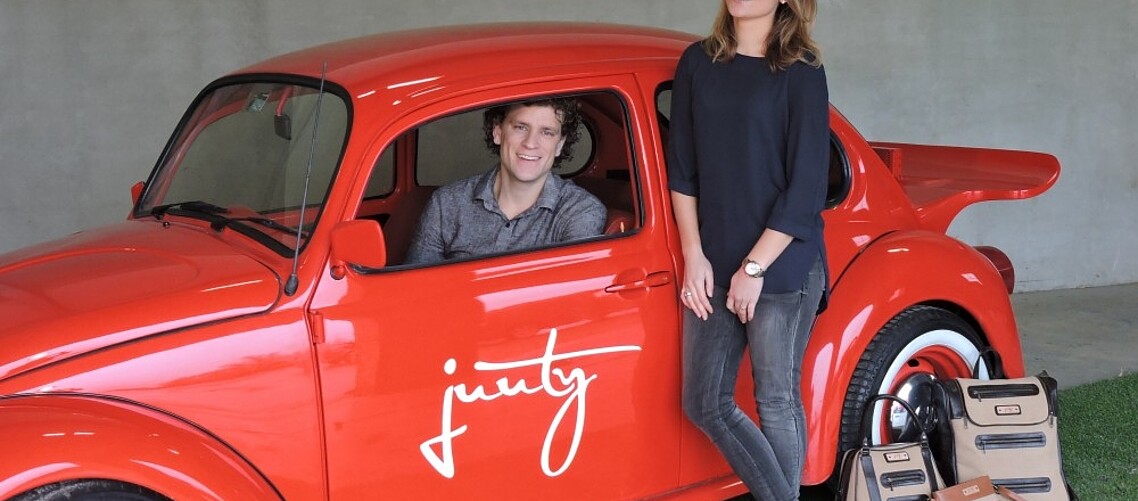After planning to be in Bangladesh for only two days, Rosanne van Kleef and her partner Rik van Dueren den Hollander stayed for two months, couch surfing with locals after falling in love with the Bangladeshi culture.
A year-long odyssey
Bangladesh was one of the unexpected stops on a world backpacking adventure that the couple took, marking the successful completion of Rosanne’s MSc in Strategic Entrepreneurship in 2014. Unknown to them at the time, Bangladesh would become the first stop on a year-long odyssey to source the most sustainable products and processes for the brand that would become Juuty.
‘We knew we wanted to do something for Bangladesh. So we started by asking ourselves: “What does Bangladesh have, what does it do well?” The answer was jute and leather.’
Entrepreneurship
Unlike the common jute used to make potato sacks, the jute produced in Bangladesh is an odourless, hard-wearing material that is silky soft to the touch. ‘It’s also one of the most sustainable fibres in the world,’ says Rosanne.
After experimenting with the idea of producing shoes, the couple realised they had the opportunity to use one of the key elements of entrepreneurship: solve a problem.
‘I could never find anything in my bag. You’re always missing a call because you can’t find your phone. And we realised that other people had the same problem.’
Responsible sourcing
Sketching a prototype design on the back of an envelope, a design that included a high number of zip pockets to eliminate the “handbag black hole”, Rosanne and Rik began the long and complicated process of finding factories and suppliers to bring Juuty to market.
‘This part was the biggest challenge. We wanted to select all of our own products. For instance we have metal accessories on our bags. These were made in a factory in China so we flew there to check the factories, the conditions, the source of the material, everything. We selected every supplier for every part of the bag. It took a lot of time and a lot of energy and a lot of disappointment – it took us a year to set up the production process, working seven days a week, often day and night, to get everything perfect.’
Tackling sexism at work
It’s not only sustainability of materials that is important to Juuty. Bangladesh is not known for gender equality – ‘When we would tour the factories, the owners would look only at Rik, speaking only to him’ – and the couple found a way to combat workplace sexism with an elegantly simple solution.
‘We gave them new clothes. Instead of women working in traditional dress, we brought in T-shirts with the Juuty brand. The next time we came back all the workers were wearing them. We could see more equality with all the people working as a team.’
Juuty is the Bangla word for couple or pair so it’s apt that Rosanne and Rik modelled equality whenever possible. ‘We were always on the same level, discussing things together. That was quite new in Bangladesh. We showed that if you work together you can improve things.’
Connections
Each bag comes with a number, a certificate, and a story that offers some insight into the high-standard principles behind the brand. Rosanne is passionate about connecting Juuty’s customers with the people who make the products and one of the core elements of the production process is that a single individual creates the entire piece.
‘Normally an employee makes just the buttons, for instance. It must be so boring! If you like your job and if you’re happy with it, the quality improves. And I really think that consumers are more aware of the production processes. Is it made in a fair way? Where are my products made? How are they made?’
25 stores
It seems that the commitment to quality at all levels of the supply chain has paid off. Juuty products are now being sold in 25 stores in the Netherlands, Belgium and Austria. ‘It has been an amazing two years,’ says Rosanne.
Her advice to young entrepreneurs is simple. ‘Get out from behind your desk and speak to people. We asked everybody: “What would you change about your bag? What annoys you?” You can’t research everything online.’
Entrepreneurship
Rik will soon take over his father’s company, yet another surprise chapter in the story of these two young entrepreneurs. This unexpected turn of events will make time a scarce resource so Juuty is being sold to an international company, carefully chosen by the founding couple.
‘We were approached by a lot of businesses that just wanted to buy the brand and didn’t care much about the story. Juuty is our baby! Our ambition was to grow the brand worldwide, to make more work for the people in Bangladesh. We’re sure that the buying company will continue to grow Juuty in the same way we would.’
Despite the challenges of entrepreneurship, Rosanne would change nothing. ‘People approach me to ask where I got my bag. I’ve never had that before – and you know, I own a lot of bags! Oh, and there was also that time that we met Bill Gates …’
This article was first published in RSM Outlook winter 2016. You can download RSM Outlook here.
